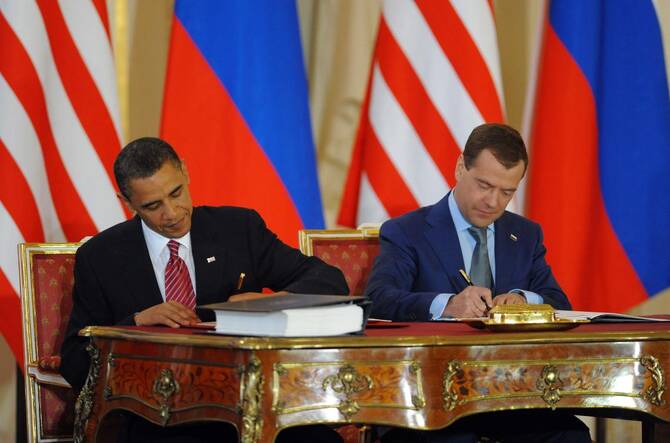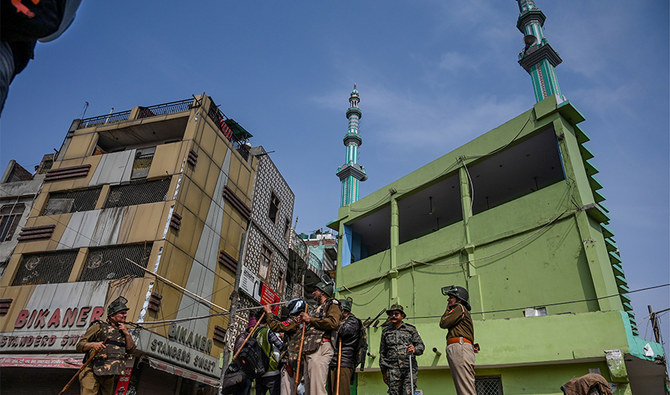NEW DELHI: Muslims in a northeastern neighborhood of India’s capital returned for weekly prayers at fire-bombed mosques on Friday, two days after a 72-hour clash between Hindus and Muslims that left at least 38 dead and hundreds injured.
Five days after they started, it was still unclear exactly what sparked the riots — the worst communal violence in New Delhi in decades — and the death toll at hospitals was continuing to rise.
“If they burn our mosques, we will rebuild them again and pray. It’s our religious right and nobody can stop us from practicing our religion,” said Mohammad Sulaiman, who was among about 180 men who prayed on the rooftop of a mosque that was set on fire in the unrest.
Tensions between Hindu hard-liners and Muslims protesting Prime Minister Narendra Modi government’s Hindu-first policies had been building for months when they exploded Sunday night, on the eve of US President Donald Trump’s first state visit to India.
Kapil Mishra, a local leader of Modi’s Bharatiya Janata Party who lost his Delhi state assembly seat in recent elections, demanded at a rally Sunday that police shut down a Muslim-led protest in the city or else he and his followers would do it themselves.
And it appears they did.
Hindus and Muslims who had lived side by side for centuries attacked each other with guns and swords, metal rods and axes, leaving the streets where the rioting occurred resembling a war zone.
There was a heavy police presence in the neighborhood on Friday. On one riot-torn street, Hindus shouted “Jai Shri Ram,” or Long Live Ram, the Hindu god, as Muslims attempted to reach a mosque damaged in the riots.
Several Muslim residents told The Associated Press that most Muslim families had locked up their homes and fled the area.
The passage of a citizenship law in December that fast-tracks naturalization for some religious minorities from neighboring countries but not Muslims earlier spurred massive protests across India that left 23 dead.
The protest violence is the latest in a long line of periodic communal clashes that date to the British partition of the Indian subcontinent in 1947, when the country was split into secular, Hindu-majority India and the Islamic state of Pakistan.
The protection of India’s religious, cultural and linguistic diversity is enshrined in its constitution. But communal tensions have occasionally flared into deadly riots, beginning with partition itself, when Hindus living in what is now Pakistan migrated to India, and Muslims in modern India to Pakistan.
Clashes claimed hundreds of thousands of lives, including Hindus, Muslims, Sikhs and people of other religions.
This week’s death toll marked the worst religiously motivated violence in New Delhi since 1984, when Prime Minister Indira Gandhi was killed by her Sikh bodyguards, triggering a wave of riots that resulted in the deaths of more than 3,000 Sikhs in the capital and more than 8,000 nationwide.
In 1992, tens of thousands of Hindu extremists razed a 16th-century mosque in northern India, claiming that it stood on Ram’s birthplace. Nearly 2,000 people were killed across the country in the riots that followed.
The religious polarization that followed saw Modi’s right-wing Hindu Bharatiya Janata Party emerge as the single largest party in India’s Parliament.
In 2002, the western Indian state of Gujarat erupted in violence when a train filled with Hindu pilgrims was attacked by a Muslim mob. A fire erupted — it remains unclear whether it was arson — and 60 Hindus burned to death. In retaliation, more than 1,000 people, mostly Muslims, were killed in the state.
Modi was Gujarat’s chief minister at the time. He was accused of tacit support for the rampage against Muslims, but a court ultimately cleared him of wrongdoing.
Violent large-scale clashes between Hindus and Muslims last took place in New Delhi in 2014, months after Modi’s party came to power, in a largely poor neighborhood close to where this week’s rioting occurred. That violence left three dozen people injured.
Ashutosh Varshney, a professor at Brown University who wrote a book about Indian riots, said the worst has been averted — at least for now.
“If it had reached the scale of Delhi 1984 or Gujarat 2002, it would have doomed Indian politics for many years to come and brought India closer to the kind of Hindu-Muslim polarization that the current ruling party would ideally want, but is finding it hard to manufacture,” Varshney said.
BJP leaders, who have sought to demonize Muslim protesters as a threat to India, may see some gain from the violence, Varshney said.
But it comes at a cost, the international perception that India under Modi has become ungovernable, he said.
Government spokesman Raveesh Kumar denied the Modi government had inflamed religious tensions in India and failed to protect minority Muslims.
“These are factually inaccurate and misleading, and appear to be aimed at politicizing the issue,” he said. “Our law enforcement agencies are working on the ground to prevent violence and ensure restoration of confidence and normalcy.”
He added that Modi had “publicly appealed for peace and brotherhood.”
“We would urge that irresponsible comments are not made at this sensitive time,” he said.


Prayers at fire-bombed mosques as India’s riot toll grows
Short Url
https://arab.news/w9vks
Prayers at fire-bombed mosques as India’s riot toll grows

- 180 men prayed on the rooftop of a mosque that was set on fire in the Tuesday unrest
- The 72-hour clash between Hindus and Muslims left at least 38 dead and hundreds injured
New START nuclear treaty ‘was flawed’: senior US official

- The New START treaty ended at the turn of the calendar on February 5
- Russia and the US together control more than 80 percent of the world’s nuclear warheads
GENEVA: A senior US official on Friday criticized the last nuclear treaty between Russia and the United States for failing to include Beijing, speaking at the United Nations a day after the New START deal expired.
“In a nutshell, New START was flawed,” said Thomas G. DiNanno, US Under Secretary of State for Arms Control and International Security, pointing out that it had not covered all nuclear weapons, “and it didn’t include China.”
Speaking to reporters in Geneva before addressing the Conference on Disarmament, he said US President Donald Trump “has been pretty clear that he wants a better agreement,” and “clarified again last night that he wants a new treaty.”
“He’s been crystal clear. He’s been consistent on it too, since his first administration,” DiNanno said.
“So we’ll see how it plays out.”
Asked if China had agreed to anything, DiNanno said: “We’re always willing to talk to them.”
China said on Thursday it would not join nuclear talks “at this stage” after the treaty’s expiry that day triggered fears of a new global arms race.
Campaigners have warned that the expiry, which ended decades of restrictions on how many warheads Russia and the United States deploy, could encourage China to expand its own arsenal.
The New START treaty ended at the turn of the calendar on February 5, after Trump did not follow up on Russian counterpart Vladimir Putin’s proposal to extend warhead limits in the agreement for one year.
Russia and the United States together control more than 80 percent of the world’s nuclear warheads, but arms agreements have been withering away.
New START, first signed in 2010, limited each side’s nuclear arsenal to 1,550 deployed strategic warheads — a reduction of nearly 30 percent from the previous limit set in 2002.
It also allowed each side to conduct on-site inspections of the other’s nuclear arsenal, although these were suspended during the COVID-19 pandemic and have not resumed since.
The Conference on Disarmament negotiating forum, which is comprised of 65 member states and meets in Geneva.
“In a nutshell, New START was flawed,” said Thomas G. DiNanno, US Under Secretary of State for Arms Control and International Security, pointing out that it had not covered all nuclear weapons, “and it didn’t include China.”
Speaking to reporters in Geneva before addressing the Conference on Disarmament, he said US President Donald Trump “has been pretty clear that he wants a better agreement,” and “clarified again last night that he wants a new treaty.”
“He’s been crystal clear. He’s been consistent on it too, since his first administration,” DiNanno said.
“So we’ll see how it plays out.”
Asked if China had agreed to anything, DiNanno said: “We’re always willing to talk to them.”
China said on Thursday it would not join nuclear talks “at this stage” after the treaty’s expiry that day triggered fears of a new global arms race.
Campaigners have warned that the expiry, which ended decades of restrictions on how many warheads Russia and the United States deploy, could encourage China to expand its own arsenal.
The New START treaty ended at the turn of the calendar on February 5, after Trump did not follow up on Russian counterpart Vladimir Putin’s proposal to extend warhead limits in the agreement for one year.
Russia and the United States together control more than 80 percent of the world’s nuclear warheads, but arms agreements have been withering away.
New START, first signed in 2010, limited each side’s nuclear arsenal to 1,550 deployed strategic warheads — a reduction of nearly 30 percent from the previous limit set in 2002.
It also allowed each side to conduct on-site inspections of the other’s nuclear arsenal, although these were suspended during the COVID-19 pandemic and have not resumed since.
The Conference on Disarmament negotiating forum, which is comprised of 65 member states and meets in Geneva.
© 2026 SAUDI RESEARCH & PUBLISHING COMPANY, All Rights Reserved And subject to Terms of Use Agreement.










